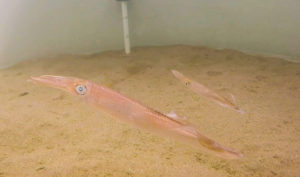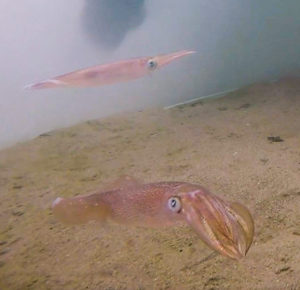18 February 2020
Mating squid don’t stop for loud noises
Posted by Lauren Lipuma
Pile driving noise startles some couples during mating … but they get used to it
By Lauren Lipuma

Loud hammering noises like pile driving disrupt the mating behavior of longfin squid, but the cephalopods seem to get acclimated to the incessant noise, according to new research.
Copyright: Woods Hole Oceanographic Institution.
Loud hammering noises like pile driving disrupt the mating behavior of longfin squid, but the cephalopods seem to get acclimated to the incessant noise, according to new research presented at the Ocean Sciences Meeting this week.
Hammering piles into the seafloor is a common technique used for building offshore structures like wind farms, but previous research shows the high-intensity noise can damage marine animals’ tissues when they are nearby or alter their behavior when the animals are further away.
Recent experiments conducted at Woods Hole Oceanographic Institution find some longfin squid get startled when they first hear pile driving noises during mating, but the animals seem to ignore the din as time goes on, returning to their normal coupling activities after some time.
Interestingly, the squid in these experiments behaved differently from individual squid in previous experiments. In prior research on individual animals, squid showed considerable alarm when startled with pile driving noise – they exhibited antipredation behaviors like inking, jetting, or changing color.
But the squid in these experiments quickly acclimated to the disruption – possibly because mating is crucial to their survival, according to the researchers.
“Considering this, we think in a social or mating context that potential alarm caused by pile driving may be mitigated,” said Madison Schumm, a biologist at the University of Texas at Austin who will present the research this week at the Ocean Sciences Meeting 2020 in San Diego.
Longfin squid bring in more than $26 million of annual revenue to the fishing industry and play an important role in the marine ecosystem. The new results help scientists better understand how human activities affect this species of squid and other marine animals, according to the researchers.
Understanding how pile driving and other human-caused noise affects mating behavior is particularly important because longfin squid have only one mating season in their short, year-long life.
“As the United States invests in wind energy development, it is essential to evaluate how pile driving will affect commercially and ecologically valuable species,” Schumm said.
Concerts and copulating
Pile driving during construction produces an incredible amount of sound that can disrupt marine animal behavior and even damage their tissues. According to Schumm, it’s the underwater equivalent of a pounding metal concert.
“If you think about going to a rock concert, you can get ear damage if it’s really loud and you’re sitting right next to the speaker,” Schumm said. “And that’s a similar issue for some marine animals. Loud human-made noises can damage hearing structures and make animals less sensitive to sound, but it can also lead to changes in important behaviors that animals perform to survive and reproduce.”

Like humans and other animals, squid have their own unique mating rituals. Male squid employ several tactics to mate with a female: smaller males in a given group typically attempt coercive copulation, where they dart at the female and try to catch her by surprise.
Copyright: Woods Hole Oceanographic Institution.
Pile driving is considered a threat to many protected species, but scientists don’t fully understand its effects on sea life – and especially on the process of reproduction.
Like humans and other animals, squid have their own unique mating rituals. Male squid employ several tactics to mate with a female: smaller males in a given group typically attempt coercive copulation, where they dart at the female and try to catch her by surprise. But larger males tend to court the females and practice something called mate guarding: they stick beside the female and protect her from sneak copulation attempts from a smaller male.
“Sometimes that large male will actually start chasing the small male, and that’s usually a response to the small male being sneaky,” Schumm explained. “Sometimes the large male’s just very aggressive, and he just happens to see the small male, and he goes after him.”
Because this mating process is so intricate, scientists wondered how pile driving noise might affect it, particularly because longfin squid are such an important species in the ecosystem and commercial industry.
Necessary interruptions
In the new study, Schumm and her colleagues exposed groups of mating squid to pile driving noise within their lab. They placed a large male, a small male, and a female squid into a cylindrical tank and added an egg mop – a cluster of fertilized eggs – to entice the animals to perform mating-related behaviors.
“The males are both visually and then tactilely attracted to [the egg mop],” Schumm said. “It kind of gets them all amped up and ready to start mating and initiating some of those mate guarding activities.”
After one of the males started consistently guarding the female, the researchers exposed the animals to 5-minute playbacks of pile driving noise. They repeated the process twice, with 10-minute breaks in between each playback, on dozens of groups of mating squid. With a speaker on one end of the tank and a hydrophone (an underwater microphone) on the other, the researchers measured noise levels in each tank and observed how the animals responded as a group.
Schumm and her colleagues saw some squid showed alarm on the first pulse of the first playback but became habituated to the racket the longer it went on. After these squid startled when the noise began, the males went back to mate guarding usually within seconds. Many individual animals showed no sign of alarm at all.
The data is still preliminary, but Schumm thinks it tells an interesting story about the interaction between environment and behavior. “It’s important to know how an animal is behaving in its environment to get a good understanding of how stimuli might affect it,” she said.
Lauren Lipuma is a science writer and program manager in AGU’s public information office.


 GeoSpace is a blog on Earth and space science, managed by AGU’s Public Information staff. The blog features posts by AGU writers and guest contributors on all sorts of relevant science topics, but with a focus on new research and geo and space sciences-related stories that are currently in the news.
GeoSpace is a blog on Earth and space science, managed by AGU’s Public Information staff. The blog features posts by AGU writers and guest contributors on all sorts of relevant science topics, but with a focus on new research and geo and space sciences-related stories that are currently in the news.